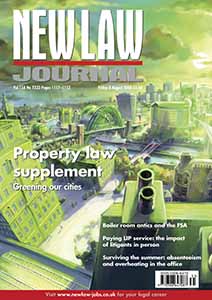
Leofelis SA and another v Lonsdale Sports Ltd and others [2008] EWCA Civ 640, [2008] All ER (D) 87 (Jul)
West London Pipeline and Storage Ltd v Total UK Ltd [2008] EWHC 1729 (Comm), [2008] All ER (D) 294
Bailey (by her father and litigation friend) v Ministry of Defence and another [2008] EWCA Civ 883, [2008] All ER (D) 382 (Jul)
CTI Group Inc v Transclear SA [2008] EWCA Civ 856, [2008] All ER (D) 290 (Jul)
Admiral Taverns (Cygnet) Ltd v Daniel [2008] EWHC 1688, [2008] All ER (D) 274 (Jul)
Criminal Evidence (Witness Anonymity) Act 2008, which came into force on 21 July 2008, enables the making of “witness anonymity orders.
Haringey London Borough Council v MA [2008] EWHC 1722 (Fam)
Coleman v Attridge Law (Case C- 303/06), [2008] All ER (D) 245 (Jul)
Proceeds of crime
Niran de Silva reflects on Dwain Chambers' failure to overturn a byelaw making him ineligible for the Beijing Olympics
MOVERS & SHAKERS

NLJ Career Profile: Ken Fowlie, Stowe Family Law
Ken Fowlie, chairman of Stowe Family Law, reflects on more than 30 years in legal services after ‘falling into law’

Jackson Lees Group—Jannina Barker, Laura Beattie & Catherine McCrindle
Firm promotes senior associate and team leader as wills, trusts and probate team expands

Asserson—Michael Francos-Downs
Manchester real estate finance practice welcomes legal director







